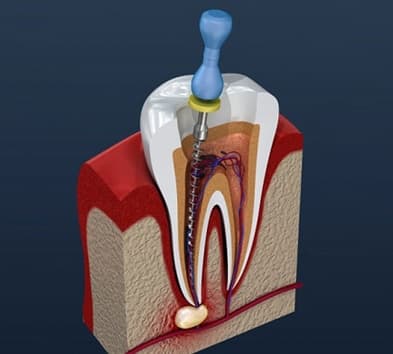Root Canal Therapy – Alexandria, IN
Save Your Natural Tooth with Comprehensive Care

When people think about root canal therapy, they tend to believe that the procedure is going to cause them great discomfort. The reality is our dental office takes all the steps to administer local anesthetics before we begin treatment. This ensures that your comfort is maintained and that your tooth is saved to the fullest extent. After all, the infection is what’s causing the pressure and discomfort in your tooth, not the procedure itself. Dr. Martinez is trained in endodontics, so you can rest knowing that you’re in good hands. If your tooth is in severe pain, contact us at Martinez Dentistry so we can help with root canal therapy in Alexandria, IN!
Why Choose Martinez Dentistry for Root Canal Therapy?
- Custom Crowns Made In-House with CEREC
- Soft Tissue Laser for More Precise Treatment
- Gentle Dentist Experienced in Endodontics
What Does Root Canal Therapy Entail?

After we’ve sufficiently administered local anesthetic (and sedation if requested), we’ll begin the process of accessing your inner tooth where the infection lies. This is done by creating a tiny access hole in the crown (top) portion of your tooth. Afterward, we can remove infected and damaged tissue, irrigate and shape the canal, then fill the canal with gutta percha. This rubber-like material is meant to replace the previously removed tissue and prevent future infections. Finally, we top the treated tooth with a filling or crown to protect it from further damage.
How Do I Know If I Need a Root Canal?

Root canal therapy is designed to eliminate a severe toothache and save a natural tooth from needing to be extracted. Also referred to as endodontic treatment, root canal therapy targets the damaged or infected inner portion of the tooth, called the pulp, where nerves and blood vessels are located. Inflammation of the dental pulp can be caused by severe decay, a fracture in the tooth, or repeated dental procedures.
If you’re experiencing any of the following symptoms, ask one of our dentists if root canal therapy could solve your problem:
- Severe toothache, especially when chewing or biting, that doesn’t subside with over-the-counter pain medications
- Tender or swollen gums
- Dark discoloration of the tooth or the gum tissue surrounding the tooth
- A crack or chip in your tooth, however minor
- Increased sensitivity to hot and cold temperatures
Benefits of Root Canal Therapy

While root canals have a daunting reputation of being painful, their main advantage is that they can alleviate your toothache. The pain that people commonly associate with root canals actually comes from before the procedure even begins.
In addition to relieving your dental pain, root canal therapy can also:
- Save as much of your natural tooth structure as possible and avoid the need for extraction
- Prevent the infection from spreading to other teeth
- Allow you to chew, talk, and smile without pain just a few days after your procedure
Post-Operative Care Tips
For a few days after your root canal, it’s completely normal to feel some tenderness in your mouth near the site of the procedure. Keep in mind that this is only temporary and, more often than not, can be treated with over-the-counter pain relievers like ibuprofen.
Also, chewing crunchy or hard foods might be difficult for the next week or so. Try to stick to a soft food diet for a few days, and then gradually introduce harder foods by chewing on the opposite side of your mouth.
Lastly, it’s imperative that you take care of your newly restored tooth by sticking to a proper oral hygiene routine. Brush with a soft-bristled toothbrush and fluoridated toothpaste twice a day. Floss between your teeth at least once a day to reduce your chances of gum infections. Visit us for checkups and cleanings every six months. If you follow these steps, your tooth treated by root canal therapy can easily last the rest of your life!
